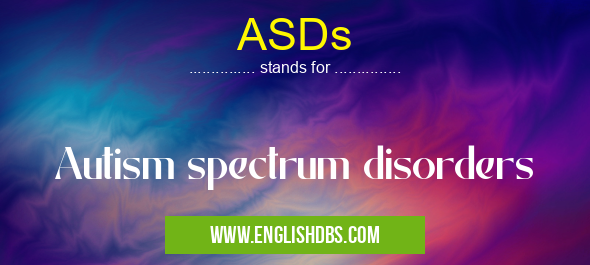What does ASDS mean in HEALTHCARE
Autism spectrum disorders (ASDs) refer to a range of neurodevelopmental conditions that are characterized by challenges with social interaction, language, and repetitive behaviors. ASDs can cause significant impairments in an individual’s ability to communicate and interact with others as well as their ability to learn. The term “autism spectrum” encompasses a wide range of symptoms which can vary in severity from person to person. In recent years, this field has advanced significantly which has allowed experts to better understand and diagnose ASDs.

ASDs meaning in Healthcare in Medical
ASDs mostly used in an acronym Healthcare in Category Medical that means Autism spectrum disorders
Shorthand: ASDs,
Full Form: Autism spectrum disorders
For more information of "Autism spectrum disorders", see the section below.
» Medical » Healthcare
Diagnosing ASD's
Individuals showing signs of ASD should be evaluated by both medical and mental health professionals who specialize in the condition. They will use the Diagnostic and Statistical Manual of Mental Disorders (DSM-5) criteria to make diagnostic assessments based on observed behavior patterns in multiple settings over time. These criteria include deficits in social communication, impairments in nonverbal communicative behaviors such as eye contact, failure to develop peer relationships commensurate with developmental level, restricted repetitive patterns of behavior or interests like spinning items or lining up objects repeatedly, etc., along with criteria related to age of onset and severity level of impairment across domains including adaptive functioning. Additionally, they may consult other specialists such as speech therapists or occupational therapists depending on the individual needs.
Essential Questions and Answers on Autism spectrum disorders in "MEDICAL»HEALTHCARE"
What Is an Autism Spectrum Disorder?
Autism spectrum disorder (ASD) is a complex developmental disability that typically appears during the first three years of life. It affects a person's ability to communicate and interact with others, and is characterized by repetitive behaviors and difficulty with social interactions.
What Are the Signs and Symptoms of ASD?
The signs and symptoms of autism spectrum disorder can vary greatly from person to person, but may include difficulty communicating or engaging in social interactions; repetitive behavior; impaired coordination; difficulty understanding abstract concepts; limited interests or activities; and sensory issues such as heightened sensitivity to sound, light, or touch.
Who Is At Risk for Developing ASD?
Anyone can be at risk for developing autism spectrum disorder, although it is more common in males than females by about 4 to 1 ratio. Factors that may increase the risk of developing ASD include family history of autistic traits, parents older than 35 years old at the time of birth, preterm birth (before 37 weeks gestation), low birth weight, and certain genetic conditions such as tuberous sclerosis.
How Is ASD Diagnosed?
Diagnosis of autism spectrum disorder often involves an evaluation by a multidisciplinary team of professionals including psychologists or psychiatrists, pediatricians, neurologists, speech-language pathologists, occupational therapists, physical therapists, special educators, audiologists etc., who use standardized tests as well as interviews with parents and caregivers to assess development and behavior.
Is There a Cure for ASD?
Currently there is no cure for autism spectrum disorder however there are various therapies available that can help individuals manage their symptoms and improve functioning. Such therapies include Applied Behavioral Analysis (ABA), social skills training groups, speech-language therapy, occupational therapy etc. It is important to note that early diagnosis and intervention are key in helping maximise outcomes.
What Are Some Medications Commonly Used To Treat ASD?
Some medications commonly used to treat associated symptoms of autism spectrum disorder include antipsychotics such as risperidone or aripiprazole; selective serotonin reuptake inhibitors (SSRI) such as fluoxetine or sertraline; stimulant medications such as methylphenidate or dextroamphetamine; sedatives/hypnotics such as melatonin or clonidine; anticonvulsants such as valproic acid etc. It is important to note that any medication should only be administered under medical supervision.
Are There Dietary Concerns For People With ASD?
Yes! In some cases dietary interventions may help reduce certain symptoms related to autism spectrum disorder. These interventions may include elimination diets which exclude foods high in sugar and artificial additives like gluten-free/casein free (GFCF) diet or specific carbohydrate diet (SCD). As these diets have potential side effects it is important to consult with a pediatrician before making any changes.
Where Can I Find Support For Myself Or My Child Living With ASD?
There are numerous support resources available for people living with Autism Spectrum Disorder (ASD). These resources may range from individual support group meetings held locally in your area for families affected by ASDs to online forums where you can connect with others living with ASDs. Additionally there are many websites dedicated to providing information on ASDs which can be helpful in providing guidance on how best to navigate through this journey.
How Can I Help Educate Others About ASDs?
One way you can help promote awareness about Autism Spectrum Disorders (ASDs) is by educating yourself on the condition so that you are not only better informed but also better equipped when discussing this topic with others around you. Additionally there are numerous organizations out there dedicated solely towards promoting awareness on ASDs like Autism Speaks which has many wonderful resources for both those affected by ASDs as well as individuals looking to spread awareness about this condition.
Final Words:
In conclusion, Autism Spectrum Disorders (ASDs) refer to a range of neurodevelopmental conditions that involve impairments in communication and social interaction skills along with restricted interests and repetitive behaviors. It is important that individuals showing signs of ASD seek evaluation from medical professionals so that they can receive an accurate diagnosis using DSM-5 criteria. With proper assessment tools available today it is possible to make more accurate diagnoses so that the individual can receive the most appropriate interventions while maximizing their potentials throughout life stages.
ASDs also stands for: |
|
| All stands for ASDS |
